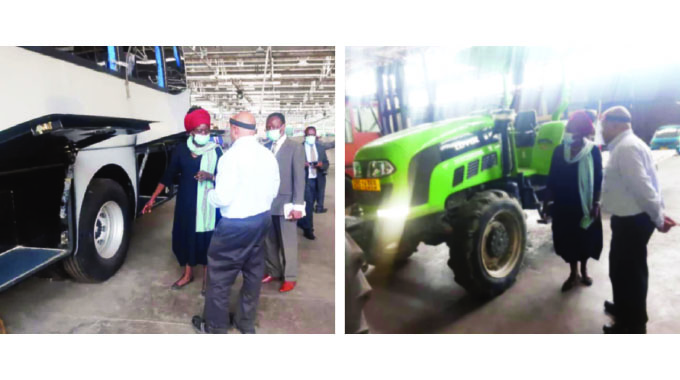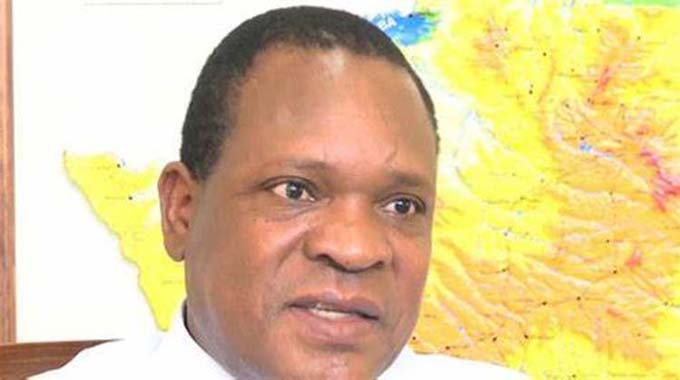Second Republic revives 3 companies in Manicaland

Mutare Bureau
THREE previously distressed companies in Manicaland — Dorowa Minerals, Quest Motors and Cacida Katiyo Estate — are reinventing the wheel following their resuscitation by the Second Republic in a positive move that firmly puts the province on course to improve its Gross Domestic Product (GDP) and the GDP per capita.
A list recently compiled by the Ministry of Industry and Commerce Permanent Secretary, Dr Mavis Sibanda, indicates that 13 companies, drawn from across different sectors, have been given new leases of life by the Government in the last three years, culminating in increased production.
Of the 13 companies rescued, three are in Manicaland Province, two are in Harare, two are in Bulawayo, and two are in the Midlands Province; while a company was resuscitated in each of the provinces of Mashonaland Central, Mashonaland East, Mashonaland West, and Masvingo.
The resuscitation of Dorowa Minerals has increased its capacity utilisation to 30 percent, producing 50 000 tonnes of phosphate per year.
This translates to 150 000 tonnes of basal fertiliser that cater for about 40 percent of national demand.
The Government is in the process of availing US$16 million to revamp the Dorowa Minerals Plant in Buhera, in a strategic move that will boost basal fertiliser production, for both the local and export markets.
The ultimate goal is to upgrade the facility into an all-in-one fertiliser plant, an initiative that fits perfectly into the Second Republic’s devolution thrust — where resources in a particular region must be value-added in situ to boost the locality’s GDP.
The phosphate plant at Dorowa was established in 1965, and the last refurbishment was done in 1973, about 50 years ago.
Dorowa Minerals mine manager, Mr Charles Mangadze said the company is in the process of procuring a new plant for magnetite, which is exclusively exported to Mozambique, using its internal financial resources.
Mr Mangadze said they have so far received the bow mill, while the rest of the components are still being manufactured in South Africa.
“We want to put a plant that produces 6000 tonnes of magnetite from the current 1 500 tonnes we are producing. The total project cost is still being worked on with the manufacturer,” he said.
At 30 percent capacity utilisation, the phosphate plant is producing 50 000 tonnes of phosphate per year.

Then Minister of State in the Office of the President and Cabinet, who was in charge of monitoring the implementation of Special Agricultural and Related Programmes, Honourable David Marapira (left) listens attentively as Dorowa Minerals general manager, Mr Charles Mangadze (centre) takes officials through the operations of the magnetite plant. — Picture: Tinai Nyadzayo.
The first phase of the plant refurbishment needs US$6 million, and will take six months to complete. It will double phosphate production from the current 50 000 tonnes to 100 000 tonnes per year.
The second phase will require US$5 million and will need three months to complete.
It will increase phosphate production from 100 000t to 150 000 tonnes, which is the mine’s full production capacity.
The third and final stage will require another US$5 million.
“I am aware that frantic efforts are being made to allocate us financial resources because it is important for us to embark on Phase One which will enable us to meet 75 percent of the national basal fertiliser demand,” said Mr Mangadze.
A ray of hope is beaming at Cicada Katiyo in Honde Valley which has been resuscitated following the injection of US$10 million from Government.
At least 300 jobs have been created at the previously distressed estate which now boasts 220 hectares of macadamia orchards and 130ha of avocados.
More jobs are expected to be created as the project keeps expanding.
An avocados plantation is expected to cover over 340ha.
Cicada Katiyo Estate manager Mr Brendon James Scott said they have managed to increase production as well as export of avocadoes since its resuscitation.
“Katiyo produced its first fly crop of avocados and we exported 70 tonnes recently. We await sales results. Macadamia are still in bring-to-bear phase,” he said.
Mutasa Ward 29 councillor, Councillor Winnet Mandipa said job creation is likely to triple in the next six months as the estate keeps employing locals.
The investment complements Government’s Rural Development 8.0 programme.
The National Development Strategy (NDS1) states that agriculture can lead to rural industrialisation which will in turn lead to rural development.
Ministry of Women Affairs, Community, Small and Medium Enterprise Development provincial development officer, Mr Gabriel Jaji said the Honde Valley Tea Growers Association recently secured a foreign investor — Engineers Without Borders (EWB).
“The project is still at embryo stage, and we are still working on the designs with EWB and a consultant. We are anticipating that this project willemploya lot of people in Honde Valley. We expect that the project will be up and running soon and we should be having tea from Mutasa by next year,” he said.
Mutare-based car and passenger vehicle assembler Quest Motors assembles different types of vehicles, ranging from passenger to light and heavy commercial vehicles.
The company produces buses, trucks, luxury cars and tractors, as well as single and double cab vehicles.

Minister of State for Presidential Affairs, Monitoring and Implementation of Government Programmes, Dr Joram Gumbo (second from left) and other Government officials being taken through the operations of the pump house by Cicada Group chief executive officer, Mr Stuart Gunn (left) during a tour of the macadamia and avocados plantations at Cicada Katiyo Estate in Honde Valley. — Picture: Tinai Nyadzayo.
Among the brands Quest Motors assembles are Foton, Zhong Tong, Yutong, JMC, Chery Tiggo as well Mitsubishi from Japan.
Against the potential of producing 1 000 units per month, the company is currently operating below its optimum capacity and employs 102 people.
The National Development Strategy 1 seeks to prioritise the promotion of the domestic automobile industry. However, the policy is not being implemented because the majority of institutions are importing.
There is already a policy issued by the Office of the President and Cabinet, which compels line ministries, departments and State institutions to procure 80 percent of vehicles only from local producers to aid industrial recovery and growth.
In 2020, Finance and Economic Development Professor Mthuli Ncube, said the Government was also coming up with a new thrust aimed at supporting industry under the National Development Strategy 1.
Minister Ncube said the thrust intended to roll out strategies to increase local production of buses and delivery trucks, which would benefit upstream industries that produce inputs such as bolts, batteries, steel sheets, tyres, upholstery, paints, and carpets.
Apart from helping drive domestic industrial recovery and growth, the policy initiatives will also align the country with requirements of the African Continental Free Trade Areas of a threshold of 35 percent local content for products from members of the trade block.
Zimbabwe launched the Motor Industry and Development Policy-2018-2030, which seeks to attract foreign direct investment into the local automotive assembly and components manufacturing sector to 10 percent of the total FDI by 2030.
It sought to achieve full capacity utilisation while boosting employment levels by 70 percent during the first year of the implementation.
Once the market for new vehicles has grown, it would create a pool of second-hand vehicles and eliminate the need to import.
Successful implementation of this policy will help the sector to become a major driver of broad-based economic growth and ensure the industry value chain is enhanced.







Comments